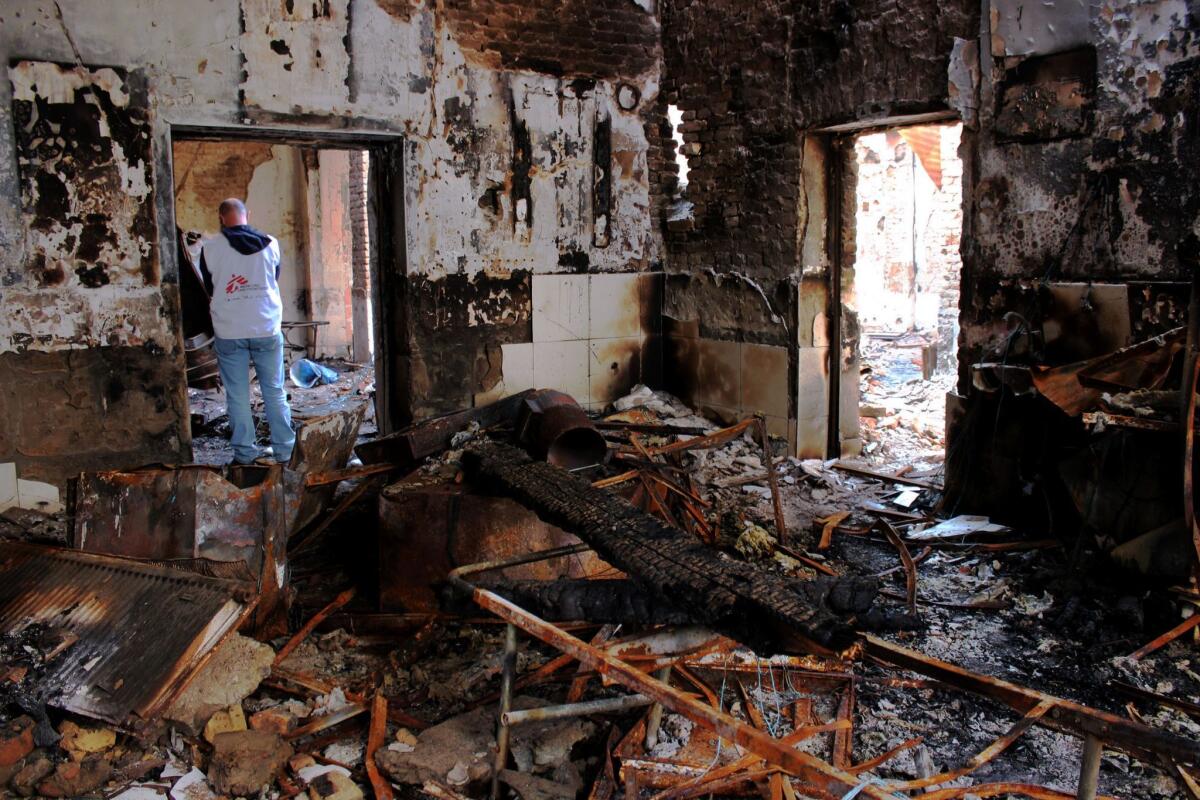Editorial: A slap on the wrist for deadly U.S. attack on hospital that killed 42 civilians

The result of a U.S. airstrike on a Doctors Without Borders hospital in northern Kunduz, Afghanistan.
The heavily redacted Pentagon report on last year’s deadly attack on a Doctors Without Borders hospital in Kunduz, Afghanistan, affirms, as early accounts had suggested, that it was the result of a chain of errors, many of them avoidable. But because the deaths of the 42 civilians — doctors, staff and patients alike, some of them incinerated in their beds — were deemed to be unintentional, the Pentagon has decided the punishments for the perpetrators should be administrative, and that none of those involved will face criminal prosecution for their misdeeds.
That is inadequate. These deaths weren’t the result of a single error that led to dropping a bomb in the wrong place, which, although regrettable, also is inevitable in a theater of war. This attack, on a building complex that had been repeatedly reported to the military command as a hospital, lasted more than an hour, even as the crew of the AC-130 gunship expressed confusion over exactly what they were being asked to do, and uncertainty over the target. And the attack continued even though Doctors Without Borders contacted American officials within 12 minutes of its onset. Why did it continue? Because, according to the Pentagon report, which was released Friday, the military officials couldn’t confirm for themselves that they were firing at a hospital, not a building full of Taliban fighters.
We won’t pretend to substitute our knowledge for the Pentagon’s, but the military’s own report suggests serious violations of the rules of war. Gen. Joseph L. Votel, the head of the military’s Central Command, acknowledged Friday that the report found that troops involved did not “comply with the rules of engagement in the law of armed conflict.” Critics argue that such an egregious failure to follow the rules of engagement should have led to criminal charges, yet the Pentagon’s recommended response is administrative discipline — reassignments, letters of reprimand, stalled and possibly ended careers.
Doctors Without Borders, Human Rights Watch and other international rights organizations have called for an independent investigation. They’re right. As American forces continue to engage in Afghanistan, Pakistan, Iraq, Syria, Somalia and, through the logistical support of Saudi Arabian bombers, Yemen, the U.S. government continues to feed the belief in parts of the world that, rather than being a force for stability and peace, it is heedless or reckless when it comes to protecting civilian lives. An internal review that determines, in effect, “nope, we committed no crimes here, so move along,” does not help.
President Obama should order an independent investigation into this horrific tragedy, and if that analysis recommends criminal charges against any of the troops involved, then the cases should be brought. To do otherwise is to flout justice, to work against the nation’s best interests and to feed cynicism about the Pentagon’s respect for its own rules of engagement.
Follow the Opinion section on Twitter @latimesopinion and Facebook
More to Read
A cure for the common opinion
Get thought-provoking perspectives with our weekly newsletter.
You may occasionally receive promotional content from the Los Angeles Times.










